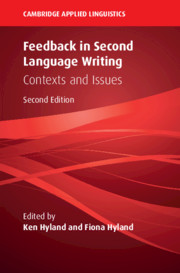Book contents
- Feedback in Second Language Writing
- The Cambridge Applied Linguistics Series
- Feedback in Second Language Writing
- Copyright page
- Contents
- Contributor Bios
- Acknowledgments
- Author's Preface
- Series Editors’ Preface
- 1 Contexts and Issues in Feedback on L2 Writing
- Section 1: Situating Feedback: Sociocultural Dimensions
- Section 2: Shaping Feedback: Delivery and Focus Dimensions
- Section 3: Negotiating Feedback: Interpersonal and Interactional Dimensions
- 9 Interpersonality and Teacher-Written Feedback
- 10 Fostering Formative Online Forums
- 11 Supervisory Feedback
- 12 Reviewers’ Feedback on Second-Language Writers’ Submissions to Academic Journals
- Section 4: Engaging with Feedback: Student Participation Dimensions
- Index
- References
12 - Reviewers’ Feedback on Second-Language Writers’ Submissions to Academic Journals
from Section 3: - Negotiating Feedback: Interpersonal and Interactional Dimensions
Published online by Cambridge University Press: 19 July 2019
- Feedback in Second Language Writing
- The Cambridge Applied Linguistics Series
- Feedback in Second Language Writing
- Copyright page
- Contents
- Contributor Bios
- Acknowledgments
- Author's Preface
- Series Editors’ Preface
- 1 Contexts and Issues in Feedback on L2 Writing
- Section 1: Situating Feedback: Sociocultural Dimensions
- Section 2: Shaping Feedback: Delivery and Focus Dimensions
- Section 3: Negotiating Feedback: Interpersonal and Interactional Dimensions
- 9 Interpersonality and Teacher-Written Feedback
- 10 Fostering Formative Online Forums
- 11 Supervisory Feedback
- 12 Reviewers’ Feedback on Second-Language Writers’ Submissions to Academic Journals
- Section 4: Engaging with Feedback: Student Participation Dimensions
- Index
- References
- Type
- Chapter
- Information
- Feedback in Second Language WritingContexts and Issues, pp. 226 - 244Publisher: Cambridge University PressPrint publication year: 2019
References
- 4
- Cited by

